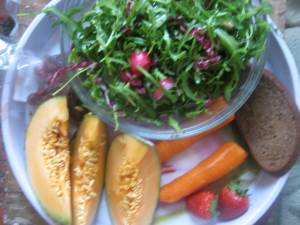Vegan Teenagers
 Although there are no “hard” numbers available, a survey by the Roper Poll in 1999 estimated that 11% of teenage girls are choosing to become vegetarians of some form rather than eat meat, poultry and fish.
Although there are no “hard” numbers available, a survey by the Roper Poll in 1999 estimated that 11% of teenage girls are choosing to become vegetarians of some form rather than eat meat, poultry and fish.
The reasons for this alleged shift range from reported environmental advantages of reducing animals for food consumption to a search for a healthier lifestyle.
The pressures on teens choosing a vegetarian lifestyle are also varied. There are the “peer-group”, “in crowd”, promoting the morality of meatless nutrition and ethical treatment of animals, there is the ever pressing quest to avoid fat to be fashionably thin and the concern of parents for the health of their children.
With the myriad of reasons for vegetarianism and a similar myriad of pressures and concerns over the relative health benefits or risks the discussion becomes murky with misinformation and misunderstanding. This discussion will not be devoted to “right and wrong” but it does discuss the nutritional concerns.
To emphasize both a concept of misperception and parental concern I relate the recent comment by one parent who observed that her teenage daughter chose a doughnut and a coke over a hamburger because she was a vegetarian. An extreme example of nutritional ignorance but it serves to demonstrate the over-simplification of a very complex nutrition issue.
Nutrition Concerns
Rapid growth and development of 13 to 19 year olds requires considerable calories and nutrients. The popular fast food diets place many teens at risk of deficiencies in nutrients like protein, calcium, iron, B vitamins, vitamin C, Vitamin A and zinc.
The same diets are usually excessive in cholesterol raising saturated fat, cancer causing trans fatty acids, acrylamides of deep fried starches and aspartame in sugar free products.
Protein deficiencies are my greatest concern. Most people do not eat enough protein in spite of popularized advice that says otherwise. I am not advocating a high protein diet but I do promote a “higher” than average protein intake.
Protein helps to build muscle, and bone (bone is 50% protein), promotes strong immunity, controls appetite and helps to keep the brain alert. Adequate complete protein is difficult to get in a “vegan” (no animal food product) diet because other than properly prepared soy, no vegetable protein is considered complete.
However, most “vegetarians” are ovo-lacto which means they eat eggs and use dairy products, both excellent protein sources. However, many teens restrict the quantities because of developed tastes or in the alleged interest of reducing calories.
Although an emphasis on plant based diets has virtue in promoting higher density micronutrient consumption, there is the risk of inadequate protein intake and the misconception that all non-meat food is more nutritious.
While colorful vegetables and fruit are high in micronutrients and fiber the more starchy cereal grains products show less nutritional density and are only modest in their contribution to fiber.
In addition, processed cereal grain flour products along with the low fiber banana, the starch filled corn, dried fruit like raisins and juices of all kinds tend to raise blood sugar and insulin production. These actions contribute to the development of hypoglycemia, Type II Diabetes, elevated cholesterol and elevated triglycerides and excess fat storage.
The Canadian Medical Association Journal shows the rate of obesity among teens has tripled in recent years. The incidence is now estimated to be 30% of teens are obese. It has also been shown that obese teens tend to become obese adults.
Hyperinsulinemia is a long word that means that if you eat too much sugar, too many carbohydrates and too much junk food you will produce too much insulin. This insulin over-load creates stored fat. While insulin is elevated you cannot burn fat for energy.
In a the December 2002 issue of the Archives of Dermatology and Australian study has even implicated “hyperinsulinemia” as the underlying cause of acne among teenagers.
One of the biggest myths promoted to potential vegetarians is that too much protein leads to the leaching of calcium from the bones with the consequence of osteoporosis. A 1998 symposium devoted to this subject was published in the American Journal of Nutrition where is was concluded that any diet below 300 grams of protein per day shows no negative effects on calcium absorption nor excretion.
Although many people will have a feeling of “well being” at the beginning of a plant based diet (because it will have an intestinal cleansing effect), the long term potential dangers of nutritional deficiencies from ignoring the details of vitamin B12 (available only in animal based food and necessary to prevent pernicious anemia), calcium intake, and protein intake can be considerable. If you choose to be vegetarian you must do so with great care for the details of your long-term nutrition.
Pro vegetarian writers place too much emphasis on “adequate calories” with little concern for protein quality. To help the vegetarian teen obtain adequate protein I am a big fan of soy protein isolate supplement drinks as a low calorie, low fat way to increase protein intake. They can be mixed with fruit to become a tasty smoothie.
You can also add soy protein supplement to pancakes, muffins and cereals. Blending tofu into soups or a stir fry is another method of increasing protein. Add nuts and seeds wherever possible and build higher protein casseroles like broccoli and cheese or vegetarian lasagna - don’t scrimp on the cheese. Cottage cheese and fruit is a tasty choice and of course omelets with colorful vegetables are excellent. Finally, supplement with a full spectrum, high quality multiple vitamin to enhance the calcium and micronutrient intake.
Author
Dr. L. Lee Coyne, the Healthy Professor
 Dr. Coyne is a former Professor of exercise physiology and nutrition and the nutrition coach to many high performance athletes including several Canadian Olympic teams. (Tanya Dubnicoff, Olympic cyclist, Michelle Morton, Olympic speed skater, several Olympic Biathletes, skiers and hockey players, Jamie Clarke, Everest Summiteers) and successful "Empty Quarter" desert expedition leader.
Dr. Coyne is a former Professor of exercise physiology and nutrition and the nutrition coach to many high performance athletes including several Canadian Olympic teams. (Tanya Dubnicoff, Olympic cyclist, Michelle Morton, Olympic speed skater, several Olympic Biathletes, skiers and hockey players, Jamie Clarke, Everest Summiteers) and successful "Empty Quarter" desert expedition leader.
His writing appears regularly in the Fit Start insert of the Calgary Sun and a bi-monthly health and fitness magazine “Impact”.
His books include “Fat Won’t Make You Fat”, “The Sports Nutrition Coaches Handbook” & “Nutritional Symptomatology, the consumers handbook”. His most recent release is “The Little Book of Nutrition Nuggets”.
You may contact Lee through Fish Creek Publishing at 1-800-668-4042, by e-mail dr.coyne@leanseekers.com or visit Dr. Coyne's website
Dr. L. Lee Coyne, the Healthy Professor.
Further Reading
Psychology Today - You're a Vegetarian. Have You Lost Your Mind? Vegetarian diets are correlated with an increase in mental health problems.
BBC - Italy proposal to jail vegans who impose diet on children. The vegetarian or vegan diet is, in fact, deficient in zinc, iron, vitamin D, vitamin B12 and omega-3.
PubMed - How prevalent is vitamin B(12) deficiency among vegetarians?
Vegetarian and “Healthy” Diets Could Be More Harmful to the Environment - Carnegie Mellon Study Finds Eating Lettuce Is More Than Three Times Worse in Greenhouse Gas Emissions Than Eating Bacon
Protein dietary reference intakes may be inadequate for vegetarians - if low amounts of animal protein are consumed. The assumption that vegetarians consume about 50% of protein from animal (dairy/egg) sources.